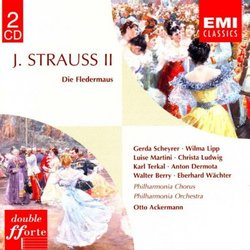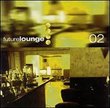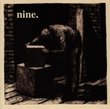| All Artists: Strauss, Dermota, Pco & Chorus, Ackermann Title: Die Fledermaus Members Wishing: 0 Total Copies: 0 Label: EMI Classics Release Date: 9/12/2000 Album Type: Original recording remastered Genre: Classical Style: Opera & Classical Vocal Number of Discs: 2 SwapaCD Credits: 2 UPCs: 724357385121, 724357385152 |
Search - Strauss, Dermota, Pco & Chorus :: Die Fledermaus
 | Strauss, Dermota, Pco & Chorus Die Fledermaus Genre: Classical
|
Larger Image |
CD DetailsSimilar CDs
|
CD ReviewsSounds great! Ryan Kouroukis | Toronto, Ontario Canada | 12/09/2004 (5 out of 5 stars) "The Ackermann Fledermaus is vintage Vienna champagne music, full of splenderous melodies and wonderful tunes! It was produced in 1959 by Walter Legge and the sound is fabulous. Everything is brought out in amazing detail and clarity. Ackermann brings out the very best of the Philharmonia and they play with much happiness and Viennese lilt and swing! The singers really outdo themselves and their acting is superb...totally characteristic and comedic! The only snag of this double-forte is that it doesn't have a libretto..just the track listings and the synopsis. Ackermann was a famous Strauss interpreter and his Fledermaus will bring you much joy!" Excellent 1959-60 stereo "Fledermaus" L. E. Cantrell | Vancouver, British Columbia Canada | 09/12/2007 (5 out of 5 stars) "SOURCE: Studio recording produced by Walter Legge and Walter Jellinek. "Die Fledermaus" was recorded at Kingsway Hall, London, in July 1959 and first issued on two Lps in 1960. SOUND: Good late 1950s analogue stereo. This CD edition was digitally remastered at Abbey Road Studios in 2000. CAST: Gabriel von Eisenstein, a prosperous Viennese gentlemen with a roving eye - Karl Terkel (tenor) and Fred Liewehr (speaker, dialogue sequences only); Rosalinde, his wife - Gerda Sheyrer (soprano); Alfred, Rosalinde's would be lover - Anton Dermota (tenor); Adele, Rosalinde's maid - Wilma Lipp (soprano); Dr. Falke, Eisenstein's good friend but also the victim of one of his practical jokes - Eberhard Wächter (baritone); Frank, Governor of the City Prison - Walter Berry (baritone); Prinz Orlofsky, a jaded and bored visiting aristocrat - Christa Ludwig (mezzo-soprano); Dr. Blind, Eisenstein's lawyer - Erich Majkut (tenor); Ida, Adele's sister - Luise Martini (speaker); Frosch, a jailer - Erich Kunz (speaker). CONDUCTOR: Otto Ackermann with the Philharmonia Orchestra and Chorus. TEXT: I have not made any close comparison of this recording with the score. Nevertheless, I believe that this is a near-complete rendition of the score, with the most significant omission limited to a verse of Adele's "Spiel' ich die Unschuld" in Act III, as noted by an earlier reviewer. The spoken dialogue likewise seems fairly complete. It should be noted that Fred Liwehr replaces Karl Terkel as Eisenstein in the spoken dialogue. (Why this should be, whether Terkel was not up to recording the dialogue or whether he was simply unavailable for the dialogue recording sessions, I have no idea.) Act II is as Strauss wrote it, and free of any nonsensical "gala performances." DOCUMENTATION: No libretto. Fairly extensive summary of the plot tied into the track listings. Track list with timings. Nothing on the performers. COMMENTARY: This recording shows producer Walter Legge attempting to correct a mistake. In 1955, EMI and Legge had chosen Herbert von Karajan to lead a performance of "Die Fledermaus." That recording was made in London with EMI's Philharmonia Orchestra and a dream cast that would be a world beater even today--except for Legge's calamitous error of dismissing the then-new stereo technology as a passing fad. The 1955 mono "Fledermaus" was not much of a basis for sales as the stereo era came to a boil, so EMI and Legge tried again in London in 1960, creating this stereo recording. In 1971, EMI took a third bite of the apple, sans Legge, but that time at last in Vienna with an authentic Viennese band and chorus, all under the baton of Willi Boskovsky. The roots of Johann Strauss II's "Die Fledermaus" stretch back to an 1851 farce in German by Robert Benedix, "Die Gefängnis" ("The Prison"). In 1872, that admirable pair of hacks, Meilhac and Halévy, cobblers of libretti for both Offenbach and Bizet, converted the old German play into a French vaudeville as "Le réveillon" ("The Revel" or perhaps "The Christmas Eve Party"). In 1873-4, the French text was re-translated back into German for Strauss to set to music, but with all references to Christmas carefully expunged as a sop to respectable Viennese sensibilities. Oddly enough, the one-time Christmas Eve tale that premiered not far away from Easter in 1874 has taken firm root in Austria and elsewhere as a New Year's Eve entertainment. If there exists a poor recording of "Die Fledermaus," I have never encountered it. Each major recording has its unique merits and its champions. Choosing the best among them is simply an exercise in expressing personal taste. "Chacun," as we are wisely advised, "à son goût." I shall limit myself to pointing out some of the salient characteristics of this recording. In the 1950s and 60s, there seems to have been a more-or-less etablished, permanent, floating "Fledermaus" repertory company. Walter Berry, Anton Dermota, Nicolai Gedda, Erich Kunz, Wilma Lipp, Erich Majkut and Luise Martini, each appear in more than one recording, although not always in the same parts. Lipp and Dermota, for example, are Adele and Alfred in Clemens Krauss' 1950 recording, just as they are here. On the other hand, Erich Kunz sang the role of Dr. Franke in Karajan's 1955 recording, while he shifts over to the spoken antics of Frosch here. Otto Ackermann was a widely hailed expert in Johann Strauss II. This "Fledermaus" clearly demonstrates that his reputation was deserved. He transforms the manifestly non-Austrian Philharmonia Orchestra into a Viennese ensemble with notably more success than Karajan four years earlier. At the same time, he welds the cast into a fine and seamless whole. I have no hesitation in recommending this 1959-60 "Fledermaus" as a well-recorded, well-sung and well-acted performance that will provide pleasure to any well-disposed listener. That said, I also have no hesitation in pointing out that this "Fledermaus" has formidable competitors. The 1950 mono recording under Clemens Krauss is dialogue-free, but it has even more of a Viennese charge than this one. Dermota and Lipp were good in 1959, but even better in 1950. Karajan's 1955 version is not as warm or as funny, but purely as singing, the performances of Schwarzkopf, Streich and Gedda remain unbeaten. This version of "Die Fledermaus" was a bargain-priced re-issue which EMI seems to have allowed to go out of print. If you are looking for this work of Johann Strauss II, snatch it up. You can't go wrong with it. Five stars." Strauss straight up Classic Music Lover | Maryland, USA | 09/08/2007 (4 out of 5 stars) "If you like a Fledermaus performance that's truly faithful to the original production, this EMI recording is the one for you. Recorded in the late 1950s, it features an all-star operetta cast of the era, including a wonderful Wilma Lipp in the role of Adele and Anton Dermota as Alfred. Christa Ludwig in the role of Prince Alexander Orlovsky is one of the funniest (campiest) versions ever committed to disk. Otto Ackermann conducts everything with a Viennese lilt that's very genuine -- even the "veddy British" Philharmonia Orchestra seems to get in on the fun quite nicely.
Thankfully, there's been no "tweaking" of the spoken dialog (which has been done FAR too often in recent productions of this operetta) -- meaning that this performance is also one of the classiest you're ever likely to hear. One small negative is in the quality of the recorded sound which seems rather thin on bass response (this was a common deficiency in EMI recordings of this era, as compared to others like RCA and Mercury). But don't let that stop you from picking up an "echt-Viennese" performance that's as engaging as it is authentic. And at EMI's special price for this 2-CD set, it's a deal." |

 Track Listings (16) - Disc #1
Track Listings (16) - Disc #1

